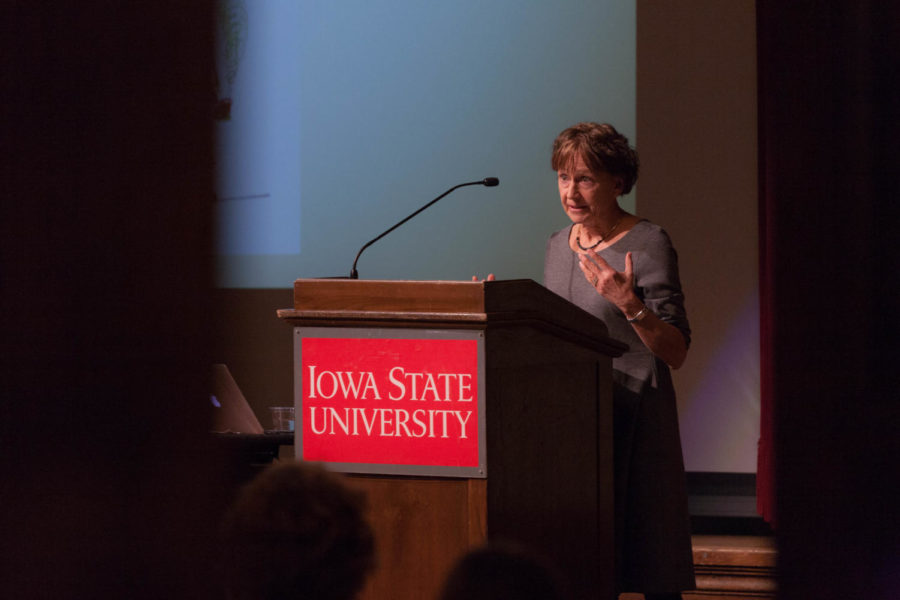Sandra L. Hanson delivers lecture on diversity in scientific fields
Alec Giljohann/Iowa State Daily
Sandra L. Hanson, professor of sociology at Catholic University, lectures in the Great Hall of the Memorial Union on Thursday night. Sandra focused her lecture on the gender difference, race and ethnicity in the sciences.
November 30, 2017
“The global perspective is especially important because around the world, there is no place where there is equality in science,” said Sandra L. Hanson in her lecture “Science for All? Diversity in Science in a Global Economy.”
Hanson is a professor of sociology at Catholic University in Washington D.C. and an author on gender and racial equality in science. Her books are titled, “Swimming Against the Tide: African American Girls in Science Education” and “Lost Talent: Women in the Sciences.”
To demonstrate the problem, Hanson showed statistics verifying discrepancies in the field. One study Hanson cited showed women represent only 22 percent of science and technology occupations. In another, comparing science scores of students internationally, the top-ranking countries included Jordan, Dubai, Qatar and Thailand. The United States, she said, is very behind.
“We’re never at the top; we’re not at the bottom,” Hanson said.
However, Hanson pointed out that education and science systems are not well connected. While Dubai was one of the highest ranking in student science scores, they ranked among the lowest in percentage of women in science occupations.
Some of the causes Hanson cited are the expectations of women in their families, the shortage of women in leadership positions and poverty as reasons that contribute to these gender gaps.
Even science textbooks were brought up as an issue. Hanson cited a study that showed 66 percent of images in science textbooks were males. Hanson said people have a hard time visualizing themselves in science positions when they are underrepresented.
Fallon Burns, an open-option freshman, was interested in Hanson’s ideas on the education system. She said she saw the lack of gender diversity and the idea that women were ‘not smart enough’ as problematic during her time in school.
“Diversity in science makes better science,” Hanson said. “You are not weakening science by having all groups represented. In fact, we will suffer if we are not using all of our science talent.”
Hanson went on to say the diversity in the U.S. should be used as an advantage, not a barrier.
However, Hanson’s points were not all related to government policy. Hanson said science teachers are also part of the problem, expecting success based on students’ demographics.
Hanson mentioned the media and her favorite television show, “The Big Bang Theory.” The female scientists are biologists while the male characters with the greater status have occupations in engineering, computer science, and physics.
Some solutions Hanson offered were changing the tax system for school funding. Hanson said a child’s quality of education is based on the neighborhood they are born in- children who are born poor are automatically disadvantaged.
Additionally, Hanson said parents can have a huge influence on their daughters in science, as well as the power of individuals in science fields. Hanson mentioned Neil DeGrasse Tyson’s rap song, Flat to Fact, has potential to impact many young minority kids who will be encouraged seeing someone of color who writes rap songs in the science fields.
Craig Ogilvie, Ph.D., the assistant Dean of the Graduate college, said Hanson presented a complex topic in a compelling way, but he also pointed out how complex the issue is.
Cause and effects are much more difficult to pinpoint in a systemic and complex problem. He mentioned special interest in that while large scale policy changes are important, individual contributions, like those of Tyson, have important roles as well.







